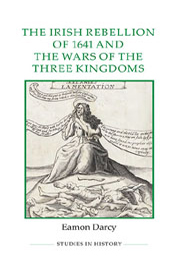Book contents
- Frontmatter
- Contents
- Acknowledgements
- Abbreviations
- Introduction
- 1 Representing violence and empire: Ireland and the wider world
- 2 Imagined violence? The outbreak of the 1641 rebellion in Ireland
- 3 Manufacturing massacre: the 1641 depositions and the Wars of the Three Kingdoms
- 4 The 1641 rebellion and violence in the New and Old Worlds
- 5 Contesting the 1641 rebellion
- Conclusion: The 1641 rebellion in its British, European and Atlantic world context
- Bibliography
- Index
3 - Manufacturing massacre: the 1641 depositions and the Wars of the Three Kingdoms
Published online by Cambridge University Press: 05 May 2013
- Frontmatter
- Contents
- Acknowledgements
- Abbreviations
- Introduction
- 1 Representing violence and empire: Ireland and the wider world
- 2 Imagined violence? The outbreak of the 1641 rebellion in Ireland
- 3 Manufacturing massacre: the 1641 depositions and the Wars of the Three Kingdoms
- 4 The 1641 rebellion and violence in the New and Old Worlds
- 5 Contesting the 1641 rebellion
- Conclusion: The 1641 rebellion in its British, European and Atlantic world context
- Bibliography
- Index
Summary
The 1641 depositions record how the rebellion spread from its epicentre in Ulster to the rest of the country. They reveal the grievances of those who took part, capture the trauma experienced by the victims and contain a wealth of information on the range of responses of the native Irish community. While collecting the testimonies, prominent members of the colonial administration consulted them. They then published some of the information through English printers and disseminated it to political figures across the three kingdoms. As a result, Catholic commentators claimed that the 1641 depositions were gathered for the purpose of composing anti-Irish and anti-Catholic propaganda. Prior to the establishment of the deposition commission, however, the lords justices gave up-to-date information from Ireland to various institutions and leading figures in British and Irish politics, expressing their concerns about their future in Ireland. Did their initial conclusions on the rebellion shape later interpretations? What influence did the news that they disseminated about the Irish rebellion have on Irish and English politics? The purpose of this chapter is to understand how the colonial administration and the deposition commission portrayed events in Ireland to the wider world.
Initial intelligence from Ireland on the 1641 rebellion
The outbreak of the rebellion occurred at a moment of considerable weakness for the lords justices in Ireland. In October 1641 the colonial authorities lacked a standing army of sufficient strength that could be mobilised quickly to suppress the rebellion.
- Type
- Chapter
- Information
- Publisher: Boydell & BrewerPrint publication year: 2013



